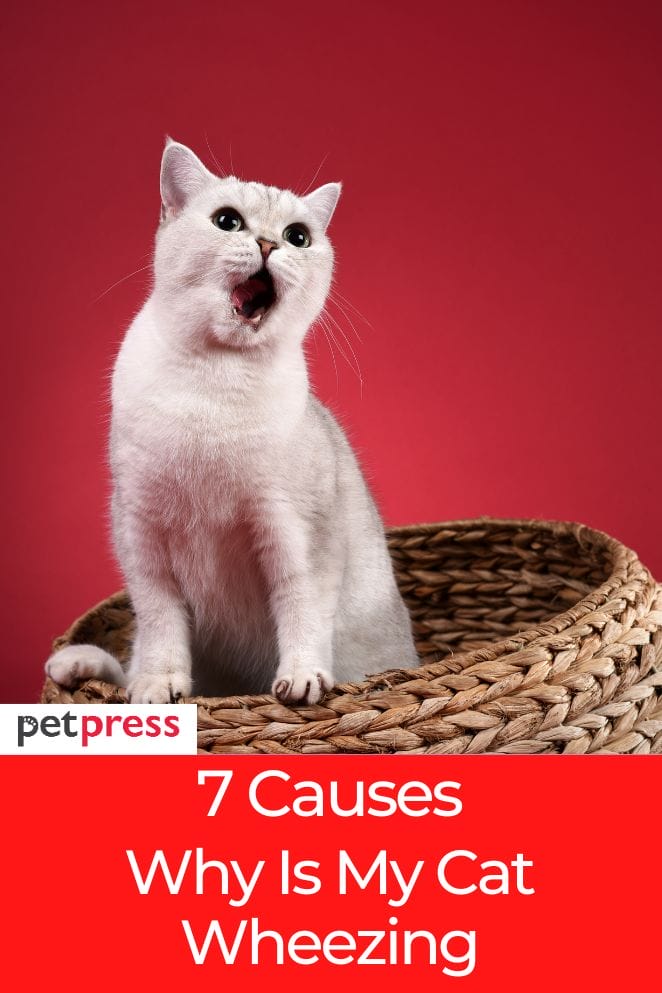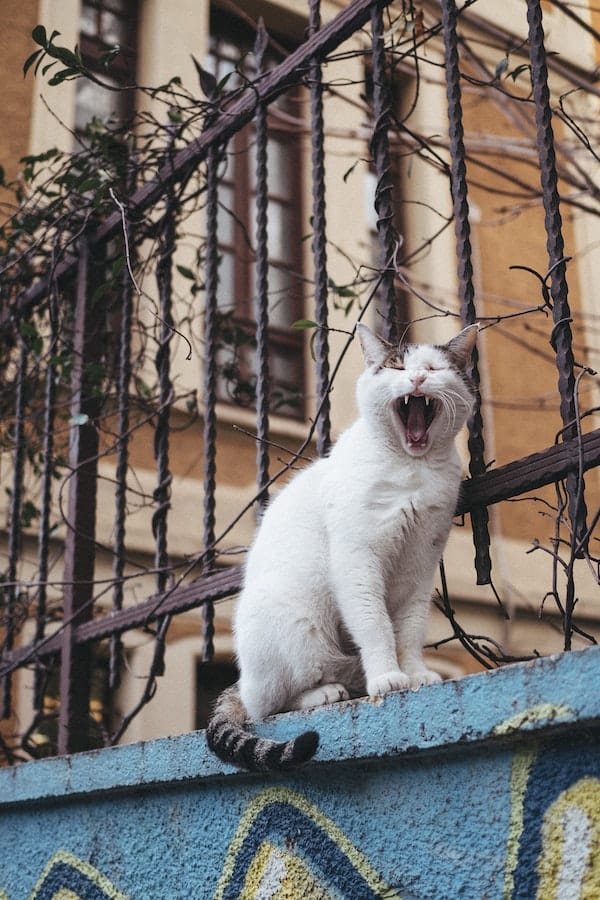
Wheezing in cats is an abnormal sound that can be caused by a variety of underlying medical issues.
If your cat is wheezing, it could be due to allergies, asthma, infections, or other respiratory conditions.
It’s important to take your cat to the vet for diagnosis and treatment as soon as possible so that the underlying cause of the wheezing can be addressed.
In this article, we’ll discuss some of the common causes of wheezing in cats and how they can be treated.
What are the common causes of wheezing in cats?

There are several potential causes of wheezing in cats. The most common ones include:
Allergies
Allergic reactions can cause wheezing in cats due to inflammation of the airways.
Common allergens include pollen, dust mites, and certain foods.
Symptoms may also include sneezing, coughing, watery eyes, or skin irritation.
Treatment usually involves avoiding exposure to the allergen as well as administering antihistamines or corticosteroids.
Asthma
Asthma is a respiratory condition that can cause wheezing in cats.
It is caused by inflammation of the airways, resulting in difficulty breathing.
Other symptoms may include coughing, sneezing, and exercise intolerance.
Treatment for asthma usually involves administering anti-inflammatory medications such as corticosteroids.
Respiratory infections
Respiratory infections are a common cause of wheezing in cats.
These infections can be viral or bacterial and can cause inflammation of the airways, resulting in difficulty breathing and wheezing.
Symptoms may also include fever, coughing, and loss of appetite.
Treatment usually involves antibiotics or other medications to help clear the infection.
Foreign body aspiration
Foreign body aspiration is when a foreign object, such as a plant seed, gets lodged in your cat’s airways and causes wheezing.
Other symptoms may include coughing, gagging, and difficulty breathing.
Treatment usually involves removing the foreign body with endoscopic surgery or other methods.
Heart disease
Heart disease can cause wheezing in cats due to fluid buildup in the lungs.
Symptoms may include coughing, exercise intolerance, and labored breathing.
Treatment for heart disease includes medications to reduce fluid buildup, as well as other medications to help improve heart function.
Stress
Stress can also cause wheezing in cats due to an increase in muscle tension.
Symptoms may include panting, tremors, and restlessness.
Treatment usually involves finding ways to reduce the stress that your cat is experiencing such as providing a safe and quiet space for them or playing calming music.
In more severe cases, your vet may recommend anti-anxiety medications.
Hairballs
Hairballs are another common cause of wheezing in cats.
Hairballs form when your cat swallows too much hair, which can then get lodged in its airways and cause difficulty breathing.
Symptoms of hairball obstruction include coughing, gagging, vomiting, and wheezing.
Treatment usually involves administering medications or supplements that help your cat pass the hairball.
How do you treat wheezing in cats?

The treatment of wheezing in cats will depend on the underlying cause. These might include:
Allergy management
Allergy management typically involves avoiding exposure to the allergen as well as administering antihistamines or corticosteroids to reduce inflammation.
Your vet may also recommend special shampoos and other products that can help reduce your cat’s sensitivity to allergens.
Asthma medications
Asthma medications are used to treat inflammation of the airways and reduce symptoms such as wheezing.
These medications usually come in the form of corticosteroids or inhalers that are administered orally or through an inhaler device.
Respiratory infection medications
Respiratory infection medications are prescribed to help clear up bacterial or viral infections.
Antibiotics are often used to treat bacterial infections, while antiviral medications may be used for viral infections.
Foreign body aspiration surgery
Foreign body aspiration surgery is a procedure that can be used to remove foreign objects from your cat’s airways.
During the procedure, a small incision is made in the throat and special tools are used to locate and remove the object.
Heart disease medications
Heart disease medications are used to reduce fluid buildup in your cat’s lungs, as well as improve heart function.
These may include diuretics, ACE inhibitors, or beta-blockers.
Hairball medications and supplements
Hairball medications and supplements are used to help your cat pass the hairballs more easily.
These may include laxatives, fiber supplements, or other products that can help soften the hairballs so they can be expelled.
When you should be concerned about your cat’s wheezing?

If your cat is wheezing and not responding to treatment, or the wheezing is accompanied by other symptoms such as labored breathing or exhaustion, you should contact your vet right away.
Wheezing can be a sign of an underlying medical condition that requires immediate attention.
It’s also important to keep in mind that cats are very good at hiding signs of illness.
If your cat is exhibiting any other changes in behavior, such as decreased appetite or activity levels, it’s important to contact your vet so they can determine the underlying cause and provide appropriate treatment.
It’s also a good idea to keep an eye on your cat for signs of wheezing and contact your vet if this occurs.
Early diagnosis and treatment of underlying medical conditions can help prevent further complications or worsening of symptoms.
Final words
Wheezing in cats can be caused by a variety of conditions, from allergies to respiratory infections and even hairballs.
Treatment depends on the underlying cause but may include allergy management, asthma medications, respiratory infection medications, foreign body aspiration surgery, or heart disease medications.
It’s important to contact your vet right away if your cat is wheezing and not responding to treatment, or if it’s accompanied by other symptoms such as labored breathing or exhaustion.
Early diagnosis and treatment of underlying medical conditions can help prevent further complications or worsening of symptoms.
You should also monitor your cat for signs of wheezing and contact your vet if this occurs.
With proper care and treatment, your cat should be able to lead a happy and healthy life.
- Does Cat Litter Melt Ice? The Complete Guide to Winter Safety - January 30, 2026
- Happy Tail Dogs: Understanding This Common Canine Condition - January 29, 2026
- How Cold Can Outdoor Cats Handle? Feline Winter Safety - January 27, 2026


GIPHY App Key not set. Please check settings